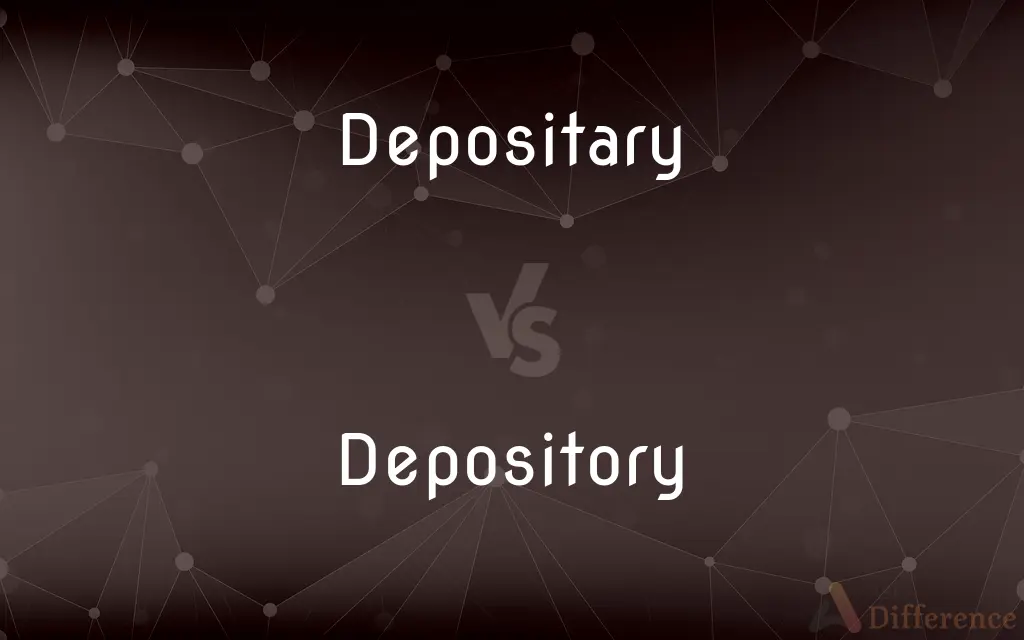Depositary vs. Depository — What's the Difference?
Edited by Tayyaba Rehman — By Maham Liaqat — Updated on March 21, 2024
A depositary is an entity that holds securities for investors, facilitating trading, while a depository is a facility where items are stored securely, like a bank or warehouse.

Difference Between Depositary and Depository
Table of Contents
ADVERTISEMENT
Key Differences
A depositary primarily refers to an institution or entity responsible for holding and safeguarding securities, such as stocks or bonds, on behalf of investors. This role is crucial in financial markets, enabling efficient transactions and trading of securities. A depository, on the other hand, is a broader term that encompasses facilities or institutions where any types of items can be stored for safety and security. This includes banks, where money is kept, or warehouses for valuable documents.
While depositaries play a key role in the trading and holding of securities, facilitating transactions and sometimes acting as transfer agents, depositories are focused on the storage and protection of assets. Depositories ensure that physical or digital items are kept securely, which can range from financial assets to important documents and beyond. This difference highlights the specific financial services role of depositaries versus the general storage function of depositories.
In terms of regulation, depositaries are often subject to strict financial regulations and oversight, given their critical role in the financial system and handling of investors' securities. They ensure the integrity of securities transactions and compliance with legal standards. Conversely, the regulation of depositories can vary widely depending on the type of asset they store and the jurisdiction they operate in, focusing on the security and preservation of the stored items.
Depositaries and depositories also differ in the services they offer. Depositaries may provide services like dividend distribution, voting rights management, and transaction settlements for securities. Meanwhile, depositories might offer a range of storage options, from safety deposit boxes for individuals to large-scale storage solutions for corporations, without the transactional component of financial securities.
The terminology and function of depositaries and depositories reflect their distinct roles in the financial and storage sectors, respectively. Understanding these differences is essential for individuals and businesses as they navigate financial investments and storage needs.
ADVERTISEMENT
Comparison Chart
Definition
Entity that holds securities for investors.
Facility for securely storing items.
Primary Function
Safeguarding and facilitating transactions of securities.
Storage and protection of a wide range of assets.
Examples
Financial institutions acting as custodians.
Banks, warehouses, safe vaults.
Regulatory Oversight
Subject to financial regulations and oversight.
Regulation varies by asset type and jurisdiction.
Services Offered
Dividend distribution, voting rights management, securities transactions.
Safety deposit boxes, secure document storage, bulk storage solutions.
Compare with Definitions
Depositary
An institution holding securities for investors.
The bank served as a depositary, managing the stocks for its clients.
Depository
A storage facility for valuable items.
The museum's depository housed rare artifacts under tight security.
Depositary
Subject to strict financial oversight.
The depositary complied with all regulatory requirements for securities management.
Depository
Regulation depends on stored asset type.
The gold depository followed specific guidelines for precious metals storage.
Depositary
Provides additional services like dividend management.
The depositary handled dividend distributions for shareholders.
Depository
Can include financial institutions like banks.
People deposited their savings in the bank, a secure depository.
Depositary
Facilitates securities trading and safeguarding.
As a depositary, the firm ensured secure and efficient bond transactions.
Depository
Ensures the safety and security of stored items.
The depository was renowned for its state-of-the-art security systems.
Depositary
Acts as a custodian for investors' securities.
Investors trusted the depositary to safeguard their investment portfolios.
Depository
Offers storage solutions for various assets.
The depository offered climate-controlled storage for sensitive documents.
Depositary
In international law, a depositary is a government or organization to which a multilateral treaty is entrusted. The principal functions of a depositary are codified in Article 77 of the Vienna Convention on the Law of Treaties.
Depository
A place where something is deposited, as for storage or safekeeping; a repository.
Depositary
A person to whom something is lodged in trust
In the seventeenth century, goldsmiths acted as depositaries for the gold of the rich
Depository
A place where something is deposited, as for storage, safekeeping, or preservation; a repository.
Depositary
(of a share or receipt) representing a share in a foreign company. The depositary share or receipt is traded on the stock exchange of the investor's country rather than the actual share, which is deposited in a foreign bank.
Depository
A trustee; a depositary.
Depository library
Depositary
One entrusted with something for preservation or safekeeping.
Depository
A place where anything is deposited for sale or keeping; as, warehouse is a depository for goods; a clerk's office is a depository for records.
Depositary
A depository.
Depository
One with whom something is deposited; a depositary.
I am the sole depository of my own secret, and it shall perish with me.
Depositary
Acting as the trusted recipient of a deposit.
The hospital was the depositary institution of our monies.
Depository
A facility where things can be deposited for storage or safekeeping
Depositary
One who receives goods or a deposit in trust.
Depositary
A place where deposits are kept
Depositary
One with whom anything is lodged in the trust; one who receives a deposit; - the correlative of depositor.
I . . . made you my guardians, my depositaries.
The depositaries of power, who are mere delegates of the people.
Depositary
A storehouse; a depository.
Depositary
One to whom goods are bailed, to be kept for the bailor without a recompense.
Common Curiosities
How does a depository differ from a depositary?
A depository refers to a facility for storing a wide range of assets securely, unlike a depositary, which specifically handles securities for investors.
What services do depositaries provide?
Depositaries offer services related to the trading and holding of securities, including dividend distribution and voting rights management.
What is the role of regulation in depositaries?
Regulation ensures that depositaries operate with integrity, safeguard investor securities, and comply with financial standards.
Do depositaries only handle stocks and bonds?
While stocks and bonds are common, depositaries can handle a variety of securities on behalf of investors.
Can banks be considered depositories?
Yes, banks act as depositories when they provide secure storage for money and other valuables.
Are all depositories regulated the same way?
No, the regulation of depositories varies depending on the type of assets they store and their operating jurisdiction.
What is a depositary?
A depositary is an entity that holds and safeguards securities for investors, facilitating trading and transactions.
Why might a business use a depository?
Businesses use depositories for secure storage of documents, backup data, and other valuable assets critical to their operations.
Do depositaries manage asset sales?
Yes, depositaries can facilitate the sale and transfer of securities held on behalf of investors.
What security features do depositories offer?
Security features may include biometric access, surveillance, alarm systems, and fireproofing, depending on the depository.
How do depositories ensure the safety of stored items?
Depositories implement security measures like surveillance, controlled access, and sometimes climate control to protect stored assets.
Can individuals use depositaries?
Individuals can use depositaries indirectly through investment services offered by financial institutions that act as custodians.
Is the use of a depository necessary for valuable items?
While not always necessary, using a depository can offer added security and peace of mind for storing valuable items.
What makes a depositary trustworthy?
A trustworthy depositary is regulated, has a strong reputation, and demonstrates a commitment to security and investor protection.
How do I choose between a depositary and a depository?
The choice depends on your needs: use a depositary for securities management and a depository for secure storage of various assets.
Share Your Discovery

Previous Comparison
Dichotomous vs. Dichotomic
Next Comparison
Convince vs. PersuadeAuthor Spotlight
Written by
Maham LiaqatEdited by
Tayyaba RehmanTayyaba Rehman is a distinguished writer, currently serving as a primary contributor to askdifference.com. As a researcher in semantics and etymology, Tayyaba's passion for the complexity of languages and their distinctions has found a perfect home on the platform. Tayyaba delves into the intricacies of language, distinguishing between commonly confused words and phrases, thereby providing clarity for readers worldwide.















































